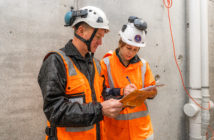University researchers are working to enhance safety and predictability in concrete construction projects

Screw anchors are gaining popularity in construction and infrastructure because of their simplicity of installation, ability to bear load straight after installation, and ease of removal.
The testing conducted by the two universities involves multiple types and diameters of screw anchors, using concrete of different compressive strengths and age.
Researches are using powerful Enerpac industrial hydraulics to test, measure and accurately predict the tensile loading capacity and failure point of screw anchors used to connect structural and non-structural elements to concrete.
The research compares results achieved in experiments with the predicted values of the Concrete Capacity Design (CCD) method.
“The universities are ensuring maximum safety is facilitated by carefully documented programmes of thorough testing from which to develop equations that predict safe load,” says Enerpac WA Territory Manager Bert Heinrich.
“They are testing the strength and resistance to pull-out failure of screw anchors.
The series of hundreds of tests involved in the ongoing programme use an Enerpac RRH307 double-acting 30-ton capacity hollow pull-cylinder mounted in a reaction frame with load cells, displacement transducers and strain gauges to measure results of multiple tests, including predicting the tensile strength of screw anchors failing under pull-out failure mode.”
The test rig developed by the School of Engineering researchers from both universities is powered by an Enerpac ZU Series portable electric pump with a powerful 1.25kW universal electric motor featuring high oil flow and bypass pressure.
This provides the portability, reliability and power-to-weight ratios required to conduct multiple tests to the point of bolt destruction in many cases.
The hydraulic tools involved are the same types used extensively in demanding industries using screw anchors, including building and construction; infrastructure and civil engineering; road and rail bridges and other structures; and mining, oil and gas and bulk handling facility construction and testing.
+64 (02) 166 7716, neville@enerpac.co.nz


